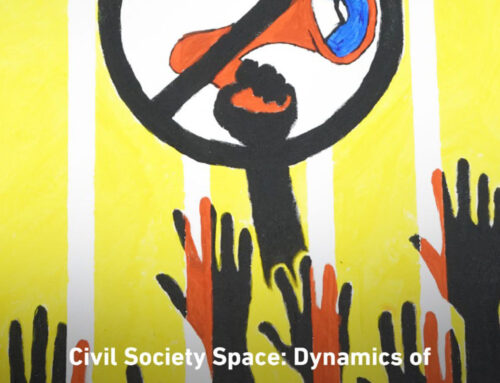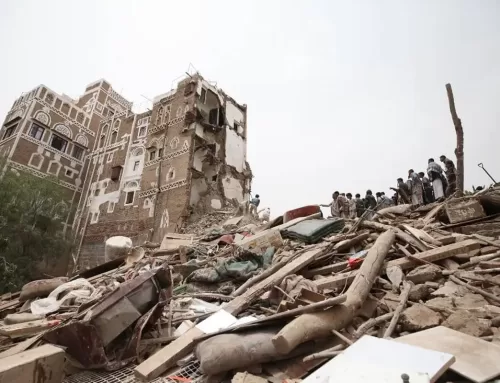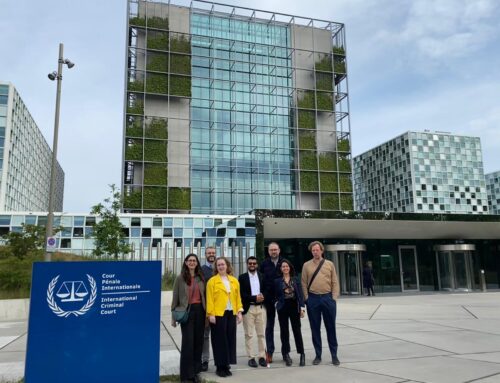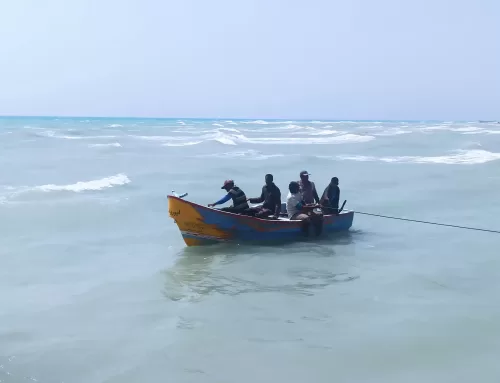States should support the creation of an international criminal mechanism
22 September 2021
SANA’A – “The failure to take serious measures to ensure accountability for human rights violations and war crimes committed and still being committed by the parties to the conflict in Yemen has contributed to creating the largest humanitarian crisis in the world, and led to the expansion of violent cycles and its patterns across the country Mwatana for Human Rights said. Mwatana asserted that the limited means of effective accountability, during the seven years of war, led to the calamity of normalizing the impunity that provided a secure environment for the violating parties.
Mwatana calls on the United Nations Human Rights Council, during its current 48th session in Geneva, to respond to the recommendations of international and local civil society organizations as well as the recommendations of the (UN Group of Eminent International and Regional Experts on Yemen (GEE)), in order to create an international investigation body focuses on criminal issues in Yemen, while ensuring the continuity of GEE’s work by a continuous or multi-year mandate.
In 2021, the parties to the conflict continued to commit violations of international humanitarian law and international human rights law. In this statement, we highlight some patterns of violations documented by Mwatana through its field team in various Yemeni governorates,: air attacks, ground attacks, recruitment and use of children, landmines, arbitrary detention, enforced disappearance, torture, as well as denial of humanitarian access.
“Yemen would not have turned into the worst humanitarian crisis in the world without the absence of accountability. The parties to the conflict trusted in impunity and did not even try to protect civilians”. Radhya Al-Mutawakel, Chairperson of Mwatana for Human Rights said .“States must make it clear that violators and war criminals will be held accountable for their actions.”
In its third report to the Human Rights Council, titled “: A Pandemic of Impunity in a Tortured Land”[1], the Group of Eminent Experts (GEE) noted that “there are no clean hands in the conflict. The responsibility for violations rests with all parties that continue to harm civilians and to commit violations of international human rights law and international humanitarian law.”
In its fourth report, “A nation abandoned: A call to humanity to end Yemen’s suffering”[2], submitted to the Human Rights Council on September 8th, 2021, the GEE regretted that the recommendations made over the past three mandates have not been acted upon, including those for creating an international criminal justice investigation mechanism, similar to that established for Syria, and referring the situation in Yemen from the Security Council to the International Criminal Court (ICC). The GEE reiterated its call for greater and immediate international actions, including the creation of an international criminal investigation mechanism, stressing that no sustainable peace can be achieved in Yemen in the absence of accountability.
In the current 48th session of the Human Rights Council, states should support the creation of an international investigation mechanism in Yemen, with adequate resources and staff, which would collect, consolidate, preserve and analyze evidence, as well as prepare case files, identify victims and document the extent and types of harm inflicted on them in light of reparation claims in each case is investigated. They should also support the renewal of the mandate of the Group of Eminent Experts (GEE) on a continuous or multi-year mandate basis, in line with other mechanisms established by the Human Rights Council on this basis (e.g. Myanmar, Venezuela, Palestine).
Throughout the seven years of conflict, the Yemeni economy has come to the brink of total collapse. This year has witnessed an unprecedented collapse in the value of the Yemeni currency due to the sharp monetary policy divisions between the areas under the internationally recognized government and those under the control of the Ansar Allah (Houthis) armed group. The depreciation of the Yemeni Riyal is a major reason for the decline in food security levels in a country that depends on imports by about 90%[3] to cover its food needs and basic commodities. UN reports indicate that the specter of famine hangs over the country, as more than half of Yemeni populations suffer from food insecurity, and more than 5 million people are directly at risk of famine[4]. In their report “Starvation Makers”[5], Mwatana and GRC conclude that members of the Saudi/UAE-led coalition and Ansar Allah used starvation as a method of warfare. Their conduct severely impeded civilians’ access to food and water, and they acted in spite of the widespread knowledge of the dire humanitarian situation in Yemen, where people, including children, were dying from starvation. Members of the Saudi/UAE-led coalition and Ansar Allah were aware of the virtual certainty that, following their conduct, starvation would occur in the ordinary course of events—that is, without humanitarian intervention—or intended to use starvation as a method of warfare.
This statement addresses patterns of human rights violations in Yemen, documented by Mwatana during the period between September 1, 2020 and September 1, 2021 through 84 site visits and at least 796 interviews with eyewitnesses, victims and victim relatives. The numbers associated with each violation give a clear indication of the continued suffering of civilians in Yemen by all parties to the conflict.
Aerial Attacks:
During the period between September 1, 2020 and September 1, 2021, Mwatana documented indiscriminate and disproportionate airstrikes that inflicted severe harm on civilians and civilian objects; nearly 15 airstrikes killed 16 civilians, including 4 children, and wounded 41 civilians, including 3 women and 13 children.
Ground Attacks:
The parties to the conflict are repeatedly implementing shells and artillery fire indiscriminately on residential neighborhoods crowded with civilians by the parties to the conflict. During the period from September 1, 2020 to September 1, 2021, Mwatana documented at least 110 indiscriminate ground attacks that killed 105 civilians, including 44 children and 17 women, and wounded at least 311 others, including 124 children and 43 women. The Ansar Allah (Houthi) group is held responsible for 71 ground attacks, coalition forces and coalition-backed forces are responsible for 18 ground attacks, Hadi government forces are responsible for 10 ground attacks.
Recruitment and Use of Children
During the period from September 1, 2020 to September 1, 2021, Mwatana documented incidents of recruiting 123 children. The Ansar Allah-Houthi group is held responsible for recruiting 89% of these children, while the armed groups supported by the Saudi/UAE-led coalition are responsible for 5%, and the internationally recognized government forces are responsible for 6%.
Arbitrary Detention, Enforced Disappearance and Torture
During the period from September 1, 2020 to September 2021, Mwatana documented incidents of arbitrary detention against 267 civilians. The government forces are held responsible for the detention of 100 civilians, while Ansar Allah (Houthi) group is responsible for the detention of 82 civilians, and the armed groups supported by the Saudi/UAE-led coalition are responsible for the detention of 85 civilians.
Mwatana has also documented incidents of enforced disappearance against 62 civilians. The Ansar Allah (Houthi) group is held responsible for the disappearance of 47 civilians, while the government forces are responsible for the disappearance of 8 civilians, and the armed groups supported by the Saudi/UAE-led coalition are also responsible for the disappearance of 7 civilians.
In addition, Mwatana documented torture incidents against 30 civilians. The Ansar Allah (Houthi) group are held responsible for torturing 13 civilians, while the armed groups supported by the Saudi/UAE-led coalition are responsible for torturing 14 civilians, and the government forces are responsible for torturing 3 civilians.
Landmines:
During the period from September 2020 to September 2021, Mwatana documented 33 landmine explosions that killed at least 22 civilians, including one woman and 10 children, and injured at least 51 others, including two women and 28 children. The Ansar Allah (Houthi) group is held responsible for laying all these landmines.
Denial of Humanitarian Access:
During the period from September 2020 to September 2021, Mwatana documented 79 incidents of obstructing humanitarian access. The Ansar Allah (Houthi) group is held responsible for 68 of these incidents, while the armed groups supported by the Saudi/UAE-led coalition are responsible for 7 incidents, and the government forces are responsibility for 4 incidents.
Mwatana reiterates its calls for establishing an international investigative mechanism and for renewing the mandate of the Group of Eminent Experts in order to combat impunity for the parties to the conflict, to hold accountable those involved in grave violations against civilians and civilian objects, and to document violations and abuses of international humanitarian law and international human rights law across the various Yemeni regions in accordance with applicable international standards. Mwatana also calls on all parties to the conflict in Yemen to comply with the international humanitarian law and international human rights law, and to ensure the safety of all civilians’ lives without discrimination.
[1] https://www.ohchr.org/EN/HRBodies/HRC/Pages/NewsDetail.aspx?NewsID=26218&LangID=E
[2] https://www.ohchr.org/EN/HRBodies/HRC/Pages/NewsDetail.aspx?NewsID=27458&LangID=E
[3] https://news.un.org/ar/audio/2015/05/329512






